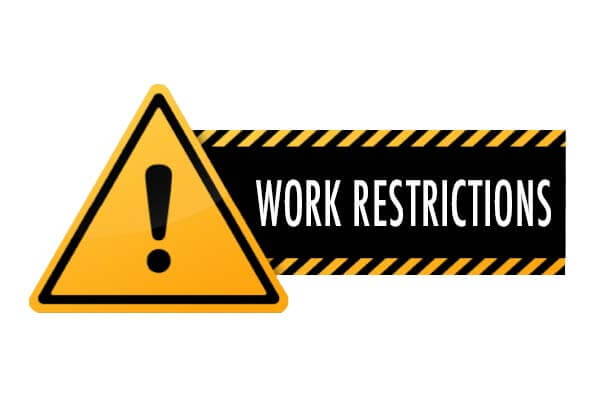Home »
Under ideal circumstances, employees injured or sickened on the job recover quickly and are able to resume their occupations as though nothing had happened. But reality is rarely idyllic.
Long before the employee is fiddle-fit, doctors sometimes declare workers sufficiently recovered to resume workplace activities, so long as they employer accommodates the worker’s physical condition. Often referred to as “modified work” or “light duty,” this back-to-work development can lead to an alarming thicket of mis-es: misunderstandings, misinterpretations, misapplications, and misapprehensions.
To make certain they are not misled or mistreated, injured/recovering workers must make certain they take precautions to protect themselves. At minimum, before crossing the light-duty threshold (assuming it is offered — and more on that in a moment), workers need to know, plainly, (a) what is expected of them and (b) what expectations their supervisors have.
Ideally — that word again — everyone will be on the same page. The employer will have an established, successful light-duty program in place. Supervisors will be well-informed and completely on board. The returning employee will be able to fulfill the modified-work role. And everyone will carry on happily ever after.
Alas, our work lives often fail those fairytale endings.
Is an Employer Required to Provide Light Duty Work?
Statutes vary from state to state, but, generally, on the topic of light duty assignments, workers compensation law cuts both ways. If it’s available, employers have to offer it. If it’s offered, employees have to accept.
The first one is a monumental “if.” Some industries simply don’t have light-duty opportunities, and some industries don’t have light-duty opportunities for certain types of workers. Imagine the oil industry worker with less than a high-school education sidelined with a back injury who has recovered sufficiently to resume activities, so long as they don’t involve bending, crouching, stooping, or lifting more than 15 pounds.
Royce Hoskins doesn’t have to imagine that worker. He’s been representing them in New Mexico’s Permian Basin for more than a quarter-century. He’s also one of them. Long before he graduated Baylor University Law School and, eventually, became owner and CEO of Roswell-based Trenchard & Hoskins, Hoskins grew up working in the West Texas oil fields.
This does not mean oil patch workers beat a path to his door the moment they’re hurt on the job. Oftentimes, the first time he sees them is, well, let’s let him tell it:
“I get this all the time,” Hoskins says. “ ‘My doctor put me at 20-25 pounds, and they got me doing the same old job where I’m lifting 50-75 pounds all the time, and it’s killing me.’ And they’re just walking into my office for the first time.”
So, not exactly “light duty.” To begin attempting to make it right, a workers compensation lawyer will file a complaint to the attention of the state workers compensation administration to call the employer to account. Eyebrow arched knowingly, Hoskins will tell his new client, “Let’s see what excuse they’ve got for this.”
As predictable as sunrise, Hoskins says, the boss — or the boss’ counsel — will indict a subordinate: “The supervisor really didn’t know what the restrictions were, so we’re gonna start accommodating them. So, I’m like, OK, the guy can continue as light duty.”
What Happens If Your Employer Does Not Have Light Duty Work?
For every injured/sickened worker, two phases of recovery come into play, Hoskins says. Workers who are in the process of recovering but have not achieved maximum medical improvement (MMI) fall into one classification. Workers who have met MMI — the patient is beyond improving through further medical or rehabilitation interventions — fall into another.
If the employer cannot, or will not, offer light or modified duty to the pre-MMI worker whose doctor says the patient cannot return to his/her previous assignment, there is but a single option: “The worker stays on temporary total disability, and they just keep rolling along like they are,” Hoskins said.
This, however, is rarely an accommodation a worker can achieve without the assistance legal counsel.
To help the attorney get this result, the worker/client must be able to provide a reliable accounting of all that has gone before. Hoskins relies on clients providing a reliable, detailed narrative, and being able to identify corroborating witnesses.
Memories being faulty and oftentimes incomplete, Scranton, Pa.-based workers comp attorney Todd O’Malley recommends writing things down. Long before a worker thinks (s)he needs legal help, keeping a contemporaneous journal helps your memory fresh. Good note-taking also is a sign of conscientiousness in a legal setting.
“Take notes, and tell somebody” O’Malley says. “If you’re still hurting three weeks later, you may get the wrong date or wrong time.”
Time that elapses between when you notice the beginning of a workplace injury and when you report it, introduces an element of uncertainty that can work against you. Maybe you played in a recreational softball league tournament or wrenched something playing golf. Maybe you sipped while hiking or strained that muscle building a deck.
These are the sorts of questions your employer’s workers compensation representative will ask. If you haven’t lined up an attorney, you may not know these are questions you don’t have to answer.
Having preserved the details in real time, let the attorney decide on its proper use. “Let me marshal the evidence,” Hoskins says, “Because you don’t want to marshal evidence; you don’t know how to do it and not let them walk over you. Because if folks are truly hard on the job, they’re truly hard.”
Can You be Fired for Work Restrictions?
Firing workers (or coercing them into quitting) over work restrictions is not unheard of, but, at least in Hoskins’ experience, it’s rare. “Fewer than 10% of my cases,” he says.
In the instances when his client is “getting jacked around at work,” Hoskins gathers the details, presents them to the adjustor or opposing counsel, and waits. “My experience is, ‘Hey, bro, we’re gonna accommodate this.’ Or we get, ‘Hey, we’re just gonna put the guy back on his regular indemnity benefits because it’s not gonna work out.’ That’s my normal.”
Again, statutes and experiences vary by state. Workers who face harassment or termination while performing light duty need local legal representation to answer key questions, such as:
- How would termination (or resignation) affect my workers comp case and benefits?
- How would termination (or resignation) affect my employment benefits?
What If I Don’t Want the Light-Duty Assignment?
Sometimes, six months will pass with the employee collecting workers comp benefits before the employer identifies a modified-work situation.
“I want it in writing what the job is and what the job entails,” Hoskins says. “How many hours a week? What does it pay? What’s the job?”
What results, says the attorney, is the “alligator lookout assignment.”
“You know, they put a guy in a chair in southeast New Mexico making sure no alligators come into the drilling yard,” he says. “Thing is, we don’t have alligators in New Mexico.”
If the employer is counting on getting out from under its workers compensation obligation by the worker quitting out of boredom, that’s just the risk the worker has to take.
Otherwise, no matter what, when modified work suitable to the worker’s condition is offered, it must be accepted. “There’s a bad consequence to the worker not showing up,” Hoskins says.
This is Hoskins counseling his disgruntled client: “You’re gonna jeopardize your whole damn case. … I’m not saying that you just have to take whatever [nonsense] they throw at you. What I’m saying is that you gotta go out there. … And then if they mess with you, don’t get in a pissing match with them.
“You just take good notes and get hold of me. … I’ll just tell the adjuster or the defense lawyer, look, we did what we’re supposed to do under the system, you guys are not doing.”
With the right legal team behind you, Hoskins says, “They always, always back down.”
The right legal team. Make no mistake about that.


